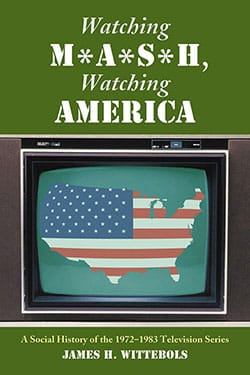Watching M*A*S*H, Watching America
A Social History of the 1972–1983 Television Series
$29.95
In stock
About the Book
It has been said that M*A*S*H was a show set in the 1950s which reflected the shifting values of the 1970s and early 1980s. Hawkeye Pierce, Radar O’Reilly, Trapper John McIntyre, Sherman Potter, Margaret (Hot Lips) Houlihan, B.J. Hunnicutt, Frank Burns, Charles Emerson Winchester, Max Klinger—these and the many other characters who populated the MASH 4077 used the Korean War as a backdrop to comment on many of the social issues of their day.
Using a unique blend of comedy and drama, the show’s first three seasons (1972–1975) focused on the anti-Vietnam War sentiment that consumed much of America. As Vietnam ended, M*A*S*H moved on to concentrate on other contemporary issues—the women’s movement, the rise of the religious right in American politics, the new narcissism that marked the early 1980s, the heightened awareness of underage or excessive alcohol use, and the increased emphasis on family in American life. How the series presented these issues and its success in doing so are the subjects of this critical study. An episode listing—brief plot outline, casts and credits, air dates, and titles—is also provided.
About the Author(s)
Bibliographic Details
James H. Wittebols
Format: softcover (6 x 9)
Pages: 284
Bibliographic Info: notes, index
Copyright Date: 2003 [1998]
pISBN: 978-0-7864-1701-8
Imprint: McFarland
Table of Contents
Acknowledgments v
Preface ix
1. The Situation Comedy as Social History 1
2. From Novel to Film to Television 11
3. It’s a Man’s War—Year 1, 1972–73 23
4. War Is Hell, But Life’s a Party—Years 2–3, 1973–75 39
5. Hearts and Minds—Years 4–5, 1975–77 61
6. This War Just Isn’t Working Out for Me—Years 6–7, 1977–79 81
7. The Party’s Over, and Radar Goes Home—Years 8–9, 1979–81 107
8. Goodbye, Farewell, and Amen—Years 10-11, 1981–83 127
9. The Legacy of M*A*S*H 143
10. Television, Values, and Social Change 153
Episode Guide 161
Notes 243
Index 261
Book Reviews & Awards
“reveals how US sitcoms have always responded to changes…examines the value systems that guide TV programming”—Choice; “provide[s] an interesting study of one of the most popular television series of all time”—Classic Images; “impeccably researched…a must for any serious M*A*S*H fan…. Wittebols’ obvious knowledge of the series and its relevance to culture is extraordinary”—Buffalo Beat; “thought-provoking book…accessible…insightful”—History: Reviews of New Books; “an invaluable document of history and the general public’s reaction to news of the day…thoroughly researched…[a] wonderful episode guide…completes the book. Wittebols wins praise from me in his detailed accounts”—Cashiers du Cinemart.






